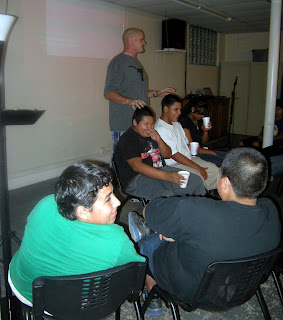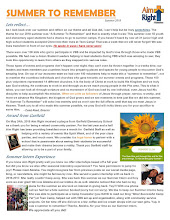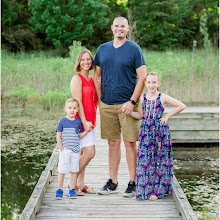Why pray for the youth and families of our city?
Friday, September 28, 2012
Reminder: 24 Hours of Prayer
Aim Right's 24 Hours of Prayer event begins this weekend with community worship at 6 p.m. on Sunday, followed by community prayer at 7:30 p.m.
Why pray for the youth and families of our city?
Why pray for the youth and families of our city?
Thursday, September 27, 2012
Recent Teen Night & Kids Klub events
We were blessed with another large group at Teen Night.
Kids Klub began a week ago with a kick-off rally, but yesterday was the first evening of classes. I think the children enjoyed meeting their "new" teachers.
The lesson was about Job -- a story that wasn't familiar to most of the children, but one that could relate well to their lives since many of them have experienced very difficult times in their families.
Monday, September 24, 2012
Unconditional: The Movie
The movie Unconditional is playing in select theaters throughout the United States, and the basic storyline is based on true events in the life of Papa Joe Bradford, who reaches out to at-risk children who live in Nashville, TN.
Visit www.unconditionalthemovie.com to find showtimes in your area or to find out how you can make a difference in the lives of at-risk children.
Visit www.unconditionalthemovie.com to find showtimes in your area or to find out how you can make a difference in the lives of at-risk children.
Friday, September 21, 2012
Fall Banquet: Engage!
Become a link in the chain of reaching at-risk youth and come to Aim Right's dinner banquet on Saturday evening, October 27th, at the Pointe Hilton Tapatio Cliffs Resort in Phoenix. An RSVP is required, and limited seating is available. To reserve your seat, contact Banquet Coordinator Stephanie Reed at (614) 561-7497 or e-mail banquet.aimright@gmail.com.
In addition to attending, here are a few other ways you can be involved in this event. They are all important (especially the third one!).
- Sponsor a table. This enables all guests to attend the banquet free of charge and helps Aim Right underwrite the costs of hosting the banquet.
- Host a table. It's your opportunity to invite other guests to join you at the banquet -- especially ones who may not be familiar with the work of Aim Right. A table seats 10 guests.
- Pray for the banquet. Some specific needs to remember are: the planning committee, those participating in the banquet program, sponsors and hosts, attendees, for God to be glorified.
- Attend an evening of prayer for the banquet: Sunday, October 14, at 6:30 p.m. at Paradise Valley Mennonite Church.
The banquet program will include a guest speaker, presentations by children and teens, and music. You don't want to miss it!
In addition to attending, here are a few other ways you can be involved in this event. They are all important (especially the third one!).
- Sponsor a table. This enables all guests to attend the banquet free of charge and helps Aim Right underwrite the costs of hosting the banquet.
- Host a table. It's your opportunity to invite other guests to join you at the banquet -- especially ones who may not be familiar with the work of Aim Right. A table seats 10 guests.
- Pray for the banquet. Some specific needs to remember are: the planning committee, those participating in the banquet program, sponsors and hosts, attendees, for God to be glorified.
- Attend an evening of prayer for the banquet: Sunday, October 14, at 6:30 p.m. at Paradise Valley Mennonite Church.
The banquet program will include a guest speaker, presentations by children and teens, and music. You don't want to miss it!
Wednesday, September 19, 2012
Teen Night 9.14.12
After a few months' break, Teen Night resumed Friday evening. The basement was both warm and full, with the audience ranging from veteran Teen Night'ers to newbie 13-year-old's and 7th graders.
Caleb shared about hardships and the life of Joseph. He had a few hardships he presented to the trio of volunteers pictured below. Each hardship involved drinking a mysterious substance. Would you rather drink cold coffee, a water/garlic powder mixture, or a water/chili powder mixture? The teen in the black shirt was unfortunately blessed with the garlic cup; he reported that his breath didn't improve until Sunday!
Friday, September 14, 2012
The Mobile Pantry: Can you help?
Beginning in October, The Mobile Pantry will be on site at Aim Right the 2nd Thursday of each month. To find out how you can be involved in this ministry to needy families, click on the image below.
"...whoever is kind to the needy honors God."
Proverbs 14:31
Wednesday, September 12, 2012
Suspended
From my office upstairs, I heard a loud thud as something hit the side of the building. I went outside to investigate and was quickly informed by Mario* that Joseph* was responsible for the sound. Apparently it is much more fun to throw a ball against a door than to use the spacious basketball court a few yards away.
Wednesdays are always half-days of school in our neck of the woods, so it wasn't unusual for these two to be out of school early. However, as I was asking Mario and Joseph how school is going, they both reported that they are suspended -- one for not doing homework, and the other for talking back to a P.E. teacher. Joseph is a 5th grader who should be in 7th grade. If his facts are correct, his suspension will keep him out of school the remainder of this week and also next week. Mario's suspension period isn't quite as lengthy, but still covers several days.
I asked both boys if their parents knew about the suspension and would punish them. "My mom is at work," one of them said, "so she doesn't know yet." It sounded like their plan is to stay away from home as long as possible today to hopefully delay the breaking of the news.
As I talked with the boys, I felt as if I was seeing a scene from this book taking shape right before my eyes. Last week I had blogged about reading the book, and some of the pages I read yesterday evening pointed to the fact that there are precursors to a student's dropping out -- most often factors that can be observed long before a student reaches high school. I made a mental list of risk factors as I observed the boys.
*not their real names
Wednesdays are always half-days of school in our neck of the woods, so it wasn't unusual for these two to be out of school early. However, as I was asking Mario and Joseph how school is going, they both reported that they are suspended -- one for not doing homework, and the other for talking back to a P.E. teacher. Joseph is a 5th grader who should be in 7th grade. If his facts are correct, his suspension will keep him out of school the remainder of this week and also next week. Mario's suspension period isn't quite as lengthy, but still covers several days.
I asked both boys if their parents knew about the suspension and would punish them. "My mom is at work," one of them said, "so she doesn't know yet." It sounded like their plan is to stay away from home as long as possible today to hopefully delay the breaking of the news.
As I talked with the boys, I felt as if I was seeing a scene from this book taking shape right before my eyes. Last week I had blogged about reading the book, and some of the pages I read yesterday evening pointed to the fact that there are precursors to a student's dropping out -- most often factors that can be observed long before a student reaches high school. I made a mental list of risk factors as I observed the boys.
- Held back in school (CHECK - at least for Joseph)
- Kicked out when teachers don't know what to do with them (CHECK - this was Joseph last school year)
- Missed a lot of school days (CHECK - suspensions typically result in missed days)
*not their real names
Monday, September 10, 2012
Lorena
The Arizona Republic recently featured this article highlighting Lorena (pictured above) and her Big Brothers Big Sisters mentor. Lorena has attended Aim Right programs for many years, and as the article indicates, her parents are some of the most hospitable folks you will find.
(P.S. Lorena and her mentor were also featured on a segment of 12 News, and the link above will take you to that as well. Look to the right and then click to play the video.)
(P.S. Lorena and her mentor were also featured on a segment of 12 News, and the link above will take you to that as well. Look to the right and then click to play the video.)
Tuesday, September 4, 2012
One of the benefits of having a break from programs is that there is time to assess how the previous year went and then make adjustments as needed for the following year. This year some of those adjustments will be due to a change in volunteer structure (no interns serving at our downtown location) as well as transportation challenges (a replacement van still needs to be purchased). Despite these adjustments that might appear to be obstacles, youth in the community are excited that programs will begin soon ("When are you starting?" is a common question as I've been out and about), and we know that the God of the loaves and fishes is more than capable of supplying the needs of the ministry.
I came across a book, Dropping Out: Why Students Drop Out of High School and What Can Be Done About It, in the new release section at the library and have begun reading it. This is not a book recommendation since I don't know that I've even conquered 10% of its pages yet, but it contains a wealth of information from statistics to real-life stories of inner-city kids to an examination of the American education system as a whole.
I don't know that I'll agree with all of the author's solutions, but one aspect certainly rings true from the book description below: It is best to reach the most vulnerable students during their early elementary years.
In Martha Snell Nicholson's poem The Bent Twig, there is this line: He listened well to what I said, but he was hardened in the mold. The twig was bent, the tree inclined. There does come a time when the course has been charted, when the hardness of heart sets in, when other things compete louder and faster for the attention. Are these youth hopeless? With God, never. But is it harder for them to make a change? For many, yes.
Students start disengaging long before they get to high school, and the consequences are severe—not just for individuals but for the larger society and economy. Dropouts never catch up with high school graduates on any measure. They are less likely to find work at all, and more likely to live in poverty, commit crimes, and suffer health problems. Even life expectancy for dropouts is shorter by seven years than for those who earn a diploma.
Rumberger advocates targeting the most vulnerable students as far back as the early elementary grades. And he levels sharp criticism at the conventional definition of success as readiness for college. He argues that high schools must offer all students what they need to succeed in the workplace and independent adult life. A more flexible and practical definition of achievement—one in which a high school education does not simply qualify you for more school—can make school make sense to young people. And maybe keep them there.
Subscribe to:
Posts (Atom)









%5B1%5D.jpg)















